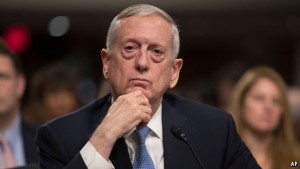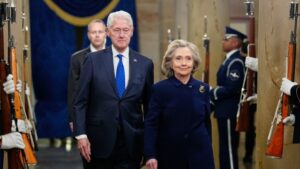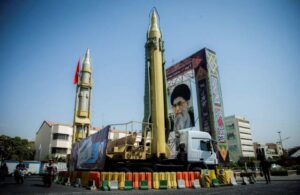The Trump administration announced Tuesday it will arm Syria’s Kurdish fighters “as necessary” to recapture the key Islamic State group stronghold of Raqqa, despite intense opposition from NATO ally Turkey, which sees the Kurds as terrorists.
The decision is meant to accelerate the Raqqa operation but undermines the Turkish government’s view that the Syrian Kurdish group known as the YPG is an extension of a Kurdish terrorist organization that operates in Turkey. Washington is eager to retake Raqqa, arguing that it is a haven for IS operatives to plan attacks on the West.
Dana W. White, the Pentagon’s chief spokeswoman, said in a written statement that President Donald Trump authorized the arms Monday. His approval gives the Pentagon the go-ahead to “equip Kurdish elements of the Syrian Democratic Forces as necessary to ensure a clear victory over ISIS” in Raqqa, said White, who was traveling with Defense Secretary Jim Mattis in Europe.
The U.S. sees the Kurdish-led Syrian Democratic Forces, or SDF, as its most effective battlefield partner against IS in northern and eastern Syria. White said they’re “the only force on the ground that can successfully seize Raqqa in the near future.”
While White did not mention the kinds of arms to be provided to the Kurds, other officials had indicated in recent days that 120mm mortars, machines guns, ammunition and light armored vehicles were possibilities. They said the U.S. would not provide artillery or surface-to-air missiles.
The officials weren’t authorized to publicly discuss the matter and demanded anonymity. They described no firm timeline, with the American intention to provide the new weapons to the Syrian Kurds as soon as possible. A congressional aide said officials informed relevant members of Congress of the decision on Monday evening.
The Obama administration had been leaning toward arming the Syrian Kurds but struggled with how that could be done without torpedoing relations with Turkey, a key political actor in the greater Middle East. The issue has come to a head now because battlefield progress this year has put the U.S.-backed Syrian Democratic Forces nearly in position to attack IS in Raqqa, although they are still attempting to isolate the city.
In a reflection of the sensitivities in Ankara, the Pentagon spokeswoman, Dana White, issued a follow-up statement hours after her initial comments. In her second statement she emphasized U.S. solidarity with Turkey and said the U.S. does not envision a long-term Kurdish presence in Raqqa. She said Mattis spoke with his Turkish counterpart, Fikri Isik, by telephone to reiterate a U.S. commitment to “protecting our NATO ally.”
Also, the State Department said Secretary of State Rex Tillerson spoke by phone with his Turkish counterpart on Monday night.
The chairman of the Senate Foreign Relations Committee, Sen. Bob Corker of Tennessee, said he is not worried about how Turkey will react.
“No. Sorry,” Corker said, adding that Washington is going to “have a little bit of a rub with Turkey for a period of time.”
Even with the extra U.S. weaponry, the Kurds and their Syrian Arab partners are expected to face a difficult and perhaps lengthy fight for control of Raqqa, which has been key to the extremists’ state-building project.
Senior U.S. officials including Gen. Joseph Dunford, chairman of the Joint Chiefs of Staff, have met repeatedly with Turkish officials to try to work out an arrangement for the Raqqa assault that would be acceptable to Ankara. The Turks have insisted that the Syrian Kurds be excluded from that operation, but U.S. officials insisted there was no real alternative.
In her second statement, White said “equipment” provided to the YPG will be “limited, mission specific and metered out incrementally as objectives are reached.”
Other officials said these safeguards are intended to reassure the Turks that the additional U.S. weaponry and equipment will not be used by the Kurds in Turkey. The intent is to restrict the distribution and use of the weaponry and then require the Kurds to return it to U.S. control, the officials said.
Turkish President Recep Tayyip Erdogan is to visit President Donald Trump in Washington next week. An Erdogan adviser, Ibrahim Kalin, met on Tuesday with Thomas Shannon, the State Department No. 2 official.
And in Denmark earlier Tuesday, Defense Secretary Jim Mattis said the U.S. and Turkey are working out their differences.
Ask me anything
Explore related questions





